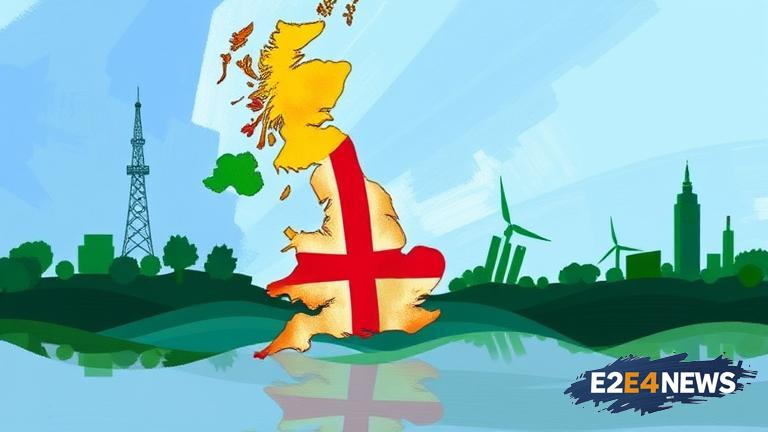The UK government has unveiled a comprehensive plan to tackle climate change, with a focus on reducing carbon emissions and achieving net-zero by 2050. The plan, which was announced by the Prime Minister, outlines a range of measures to be taken across various sectors, including energy, transport, and industry. One of the key measures is the introduction of a new carbon pricing system, which will provide a financial incentive for companies to reduce their emissions. The government has also announced plans to increase the use of renewable energy, with a target of generating 40% of the UK’s electricity from renewable sources by 2030. Additionally, the plan includes measures to improve energy efficiency in buildings, with a goal of reducing energy consumption by 20% by 2030. The transport sector will also see significant changes, with the government announcing plans to phase out the sale of new petrol and diesel cars by 2030. Furthermore, the plan includes measures to reduce waste and increase recycling, with a target of recycling 65% of waste by 2030. The government has also announced plans to invest in new technologies, such as carbon capture and storage, to help reduce emissions. The plan has been welcomed by environmental groups, who have praised the government’s commitment to tackling climate change. However, some have expressed concerns that the plan does not go far enough, and that more needs to be done to address the scale and urgency of the crisis. The government has said that it will review and update the plan regularly, to ensure that it is on track to meet its targets. The plan is part of the UK’s efforts to meet its commitments under the Paris Agreement, which aims to limit global warming to well below 2 degrees Celsius. The UK has also announced plans to host the COP26 climate summit in 2021, which will bring together world leaders to discuss global action on climate change. The government has said that it will work with other countries to share knowledge and expertise, and to develop new technologies and solutions to tackle climate change. The plan has been developed in consultation with a range of stakeholders, including businesses, NGOs, and community groups. The government has said that it will continue to work with these groups to ensure that the plan is implemented effectively. The plan is a significant step forward in the UK’s efforts to tackle climate change, and demonstrates the government’s commitment to reducing carbon emissions and achieving net-zero by 2050. The government has also announced plans to establish a new climate change committee, which will provide independent advice and scrutiny of the plan. The committee will be made up of experts from a range of fields, including science, economics, and industry. The government has said that it will work closely with the committee to ensure that the plan is implemented effectively, and that it is on track to meet its targets. The plan is a key part of the UK’s efforts to reduce its carbon footprint, and to contribute to global efforts to tackle climate change. The government has also announced plans to increase funding for climate change research and development, to help develop new technologies and solutions. The plan has been welcomed by businesses, who have praised the government’s commitment to providing a stable and predictable policy framework. The government has said that it will work with businesses to ensure that they are able to thrive in a low-carbon economy, and to provide support and guidance to help them reduce their emissions. The plan is a significant step forward in the UK’s efforts to tackle climate change, and demonstrates the government’s commitment to reducing carbon emissions and achieving net-zero by 2050.
